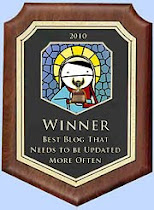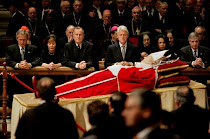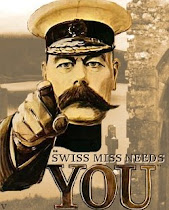I shouldn't read biographies since they leave me feeling like I know the person enough to address them on the street. Several people have mentioned that biographies make them feel an artificial relationship with someone they never knew. It's odd to remind myself that all I know about Hilare Belloc, aside from the few works of his that I have read, my information comes from one person who never knew Belloc himself and has only tried to "clothe him" with the traces the man left behind.
Although Pearce's use of language remains annoying (I loved his book on Shakespeare because the subject fascinated me, but his words, especially starting out, are heavy...how many people (aside from Chesterton) repeatedly use the words jingoist or penury) and some of his speculations are truly just that, I can understand why he attempted to bring some life to his subject. Genealogists try to do the same. Tracing ancestors back through time, following their every move, trying to piece together their trail.
Slightly more than a decade ago, I sat on the steep hillside along side my great-great-grandfather's well-weathered grave marker. It took years of research to follow him to an obscure and mostly abandoned cemetery in southern Wisconsin where he had rested for generations without family visitors.
What I got from tracing my grandfather was how he, like most of my ancestors, sacrificed to come to this country for their faith. Undoubtedly, there were numerous reasons these ancestors had to immigrate to the US, but for so many of them, their faith was readily apparent and central to their lives. I love the surviving first-hand account about how another branch of Irish ancestors used to say the rosary each night in Gaelic.
My family, unlike Belloc's, was not fortunate enough to have had a prolific writer provide so much detail about the day-to-day struggles of what it is like living and persevering as a Catholic. Belloc is quoted in the book,
"I always like being in America, and find it most amusing. The newspapers tell one very little about Europe. The similarity of the language makes them sometimes talk about England as though they knew it better than the other countries, but it is just as foreign to them as all the others."
No wonder Belloc had a love of history and a desire to write it from a Catholic perspective. He knew the danger in disconnecting from the past.
However slight and vicarious they may be, biographies do allow us to see things from a different perspective. For me, researching my ancestors, like reading Belloc's biography to some extent, has allowed me to see their faith and why they cherished it.



















2 comments:
Bless me Swissy for I have literacyly-sinned. I avoid Pierce's books because I find the language too dense and intimidating. I confess further to having the same problem with the ever wonderful Aidan Nichols.
I can't help thinking that if a thing can be said, it can be said plainly.
Meanwhile I am reading Christopher Dawson and the kid's Vision Books. I like the kid's books. They make sense to me. (To be fair to Dawson, he makes sense too. It's just harder on the grey cells).
God bless
I agree, mum. Just say things plainly instead of puffing up the language. Dawson is hard on the grey cells to be sure. Vision books are more my speed.
Post a Comment